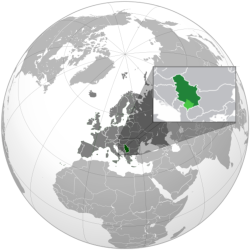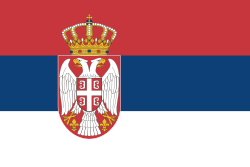Serbia
 From RationalWiki - Reading time: 4 min
From RationalWiki - Reading time: 4 min

Serbia is a Balkan country in Southeastern Europe, a former part of Yugoslavia. It's south of Hungary, west of Romania and Bulgaria, north of the Republic of Macedonia, and east of Croatia, Bosnia and Herzegovina, and Montenegro. Some consider it to also border Albania, depending on whether you count Kosovo as an independent country.
Population[edit]
The country's population is 6.6 million, most of whom are Serbs (82%). With Kosovo, the population of Serbia rises to some 9 million, while the ratio of Serbs drops below 70%. Also, some 1-1.5 million Serbs live in neighboring countries: Bosnia and Herzegovina (where they are one of three constituent peoples),[notes 1] Montenegro, and Croatia. Before the Kosovo War, Albanians were the second-largest ethnic group. From 1999 Kosovo was supervised by the UN; it declared independence in 2008; international supervision ended in 2012. Other substantial ethnic groups are Hungarians and Bosniaks (in some cases they are referred as "Muslims" on the demographic papers, but be careful; ethnoreligious labels can have subtle or severe implications), despite most of them not being from Hungary or Bosnia itself.
Culture[edit]
Serbs (religious ones) are predominantly followers of the Serbian Orthodox Church, and have been shown to be prideful towards it. There are several paintings and literary works that commemorates the Serbian Orthodox Church, mainly by Serb painters, such as Nadežda Petrović, Đura Jakšić, Mića Popović, and authors such as Dositej Obradović, Miloš Crnjanski, Ivo Andrić, Isidora Sekulić. One of these authors is Vuk Stefanović-Karadžic, who reformed the Serbian alphabet, who collected Serbian folklore, constructed grammar and thus is considered to be the "father of modern Serbian language" or "father of modern Serbian literacy", which is commonly spoken in Serbia, albeit in different dialects. Dositej Obradović brought enlightement and rationalism into Serbia.
Political parties[edit]
- Serbian Progressive Party
- Populist conservatives and the largest party in government since 2012, founded after the split of the Serbian Radical Party. Vaguely pro-EU.
- Socialist Party of Serbia
- The second largest party in the coalition government and ruling party through the turbulent 1990s. Successors of the League of Communists and Slobodan Milošević. Now identifies as social-democratic.
- Democratic Party
- Governing party 2000–2012. Serbian equivalent of Democratic Party.
- Serbian Radical Party
- Once the largest (eternal, except during the Kosovo crisis in the late 1990s) opposition party, economically left and socially conservative. Staunchly anti-EU and anti-USA, pro-Russian, pro-Castro, pro-Gaddafi, pro-Chávez, pro-everyone-that-opposes-USA-except-Al-Qaeda. Great fans of Vladimir Zhirinovsky and Jean-Marie Le Pen. Western media usually portray them as ultranationalists, although there are more nationalistic options. Fell short of the census in the 2012 elections but again became the largest opposition party in 2016.
Minor parties[edit]
- Liberal-Democratic party
- An offshoot of the Democratic Party. Staunchly pro-EU and pro-NATO, even if it means losing Kosovo.
- Christian Democratic Party of Serbia
- The Christian democratic party. Basically, centrists on economics and social issues.
- Social Democratic Union of Serbia
- First integration merged with Social Democracy but split off. It has been in a coalition with the Liberal-Democratic party since 2014.
- Serbian Renewal Movement
- Moderate monarchist, pro-NATO. The main opposition party in the early 1990s. Today lost almost all significance.
- New Serbia
- Socially conservative offspring of Serbian Renewal Movement.
- Democratic Party of Serbia
- Opposition. Serbian equivalent of the Republican Party. Staunchly anti-EU due to the Kosovo problem.
- League of Social Democrats of Vojvodina
- Social Democrats that advocate an increase of Vojvodina's autonomy in Serbia.
- United Regions of Serbia
- Moderates that advocate decentralization of Serbia. Defunct.
- Dveri
- Serbian Religious Right (anti-gay, anti-EU, conspiracy theorists, anti-"Darwinists", etc.).
Organizations[edit]
- Obraz (Honor) - batshit crazy far-right religious fundies. The Constitutional court of Serbia outlawed the organization, and its leader is facing trial.
- Levijatan (Leviathan) - A far-right version of PETA
Miscellaneous[edit]
- Teaching creationism in schools: elective subject alongside civics. All religious groups had/have great liberty in education (they write textbooks, choose teachers)...
- Abortion - legal
- Gay-marriages - Constitution of Serbia only recognizes heterosexual marriages, albeit it is slowly being more common within Serbia's younger generation, to which they don't give a fuck about the constitution.
People[edit]
Who you would like to meet[edit]
- Ana Ivanović,
 Serbian tennis player
Serbian tennis player - Jovan Cvijić,
 Serbian geograph
Serbian geograph - Mihailo Pupin,
 Serbian telecommunications scientist and writer
Serbian telecommunications scientist and writer - Nikola Tesla, Serbian scientist
- Novak Đoković,
 Serbian tennis player and demi-God
Serbian tennis player and demi-God - Milunka Savić,
 Serbian WWI heroine
Serbian WWI heroine
Who you certainly don't want to meet[edit]
- Branimir Nestorović, former pulmologist and grifter who peddles pseudoscience, conspiracy theories and far right nationalism
- Saša Borojević, another conspiracy theory peddler
- Jovan I. Deretić, not to be confused with the Serbian linguist who has the same name
- Ljiljana Čolić
- Miroljub Petrović
- Novak Đoković,
 since he started peddling pseudoscience and nationalism
since he started peddling pseudoscience and nationalism
Other[edit]
- Slobodan Milošević, deceased war criminal, genocidal maniac and president of FR Yugoslavia
- Radovan Karadžić,
 war criminal, genocidal maniac and president of Republika Srpska, sentenced to life imprisonment
war criminal, genocidal maniac and president of Republika Srpska, sentenced to life imprisonment
Notes[edit]
- ↑
Republika Srpska
 (nearly 49% of Bosnia) is a Serb-dominated entity
(nearly 49% of Bosnia) is a Serb-dominated entity
 KSF
KSF